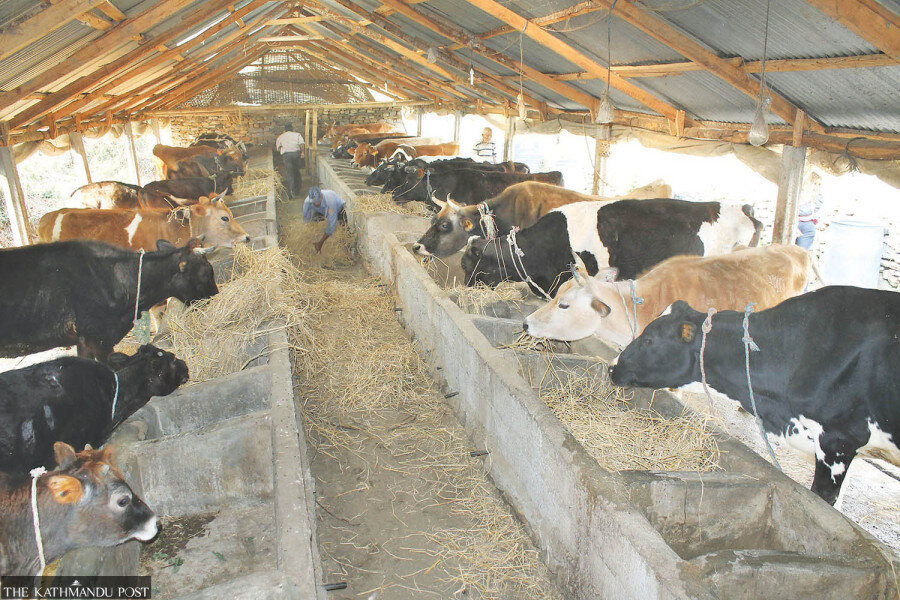Money
DDC gets Rs600 million credit to pay dairy farmers
However, dairy farmers are not optimistic they will get their dues before Dashain due to the lengthy process.
Post Report
As the countdown for Nepal’s biggest festival begins, the government has issued Rs600 million in credit to the state-owned dairy to pay the farmers, whose dues have been piling up for months.
However, dairy farmers are not optimistic they will get their dues before Dashain.
Ghatasthapana, the first day of the 10-day festival, begins on Thursday.
The Public Debt Management Office issued the Rs600 million loan to the Dairy Development Corporation (DDC) on Friday.
“We received the confirmation from the Public Debt Management Office today [on Friday]. Now, we will discuss the mode of payment to the farmers with the board of directors and take a decision accordingly,” said Surya Prasad Paudel, general manager of the DDC.
“Once we make the decision, the Ministry of Agriculture and Livestock Development will be informed,” he said.
Agriculture Minister Ram Nath Adhikari, who took office on July 15, has repeatedly said that farmers would get paid before Dashain.
Paudel said there are currently two options: send the money to cooperatives from the DDC to pay dairy farmers or send it directly to their accounts with the help of the cooperative. “We have yet to decide.”
But dairy stakeholders say there is little chance that farmers would receive the payment before Dashain.
“Even after paying Rs600 million to farmers, the DDC still will have around Rs2 billion arrears,” said Ganesh Chandra Timilsina, coordinator of the National Peasants' Coalition, the association of the farmers.
Timilsina said the private dairy still had around Rs6 billion dues to be paid to the dairy farmers, but nearly half of the dues have been cleared.
Private dairies recently started clearing the farmers' payments every week, he said.
“As farmers are in trouble and need money to celebrate the festivals, we plan to knock on the door to the Prime Minister's Office, asking the PM to clear farmers’ dues before Dashain,” Timilsina said.
The private dairy industry has also requested the government to provide loans to pay the farmers.
“We have asked the government for loans by offering our butter and powder milk stocks as collateral,” said Prahlad Dahal, president of the Nepal Dairy Association. “But the government ignored our request.”
“This is discrimination,” he said. “We are in the same business, but loans are available to the DDC only. This shows how the government looks at the private sector.”
“The private dairies are also a big problem, and it's the government’s responsibility to bail them out of the crisis,” he said.
The private dairies have stocks of butter and powder milk worth Rs4.5 billion, Dahal said.
It would be troubling for private dairy companies to pay farmers if the government does not provide them with loans.
According to the association, the private dairy has around Rs2 billion dues to be paid to the farmers.
The association said that 3.2 million litres of milk arrive in the market daily, of which around 25 percent is held by the DDC and the remaining is purchased by private dairies.
The daily purchases of the private dairies are around Rs100 million.
On March 4, the Ministry of Agriculture and Livestock Development signed an agreement between three dairy associations—Central Dairy Cooperative Association, Nepal Dairy Association and Dairy Industry Association—and the state-owned Dairy Development Corporation, to settle the farmers' dues by April 3.
As per the agreement, the farmers who have not received payments since August last year until mid-January, were to receive the payments by April 3.
But the promises were broken.
Most of the farmers in eastern Tarai are facing even more hardships as it has been nearly a year since they received any payments.
According to the dairy association, the farmers of Jhapa and Biratnagar [Morang] have not received their payments for months. The farmers of Chitwan are also in trouble.
Both state-owned and private dairies have been saying that the ongoing economic slowdown has dampened dairy demand, resulting in stopped cash flow and rising liabilities to farmers as products remained unsold for nearly a year.




 9.25°C Kathmandu
9.25°C Kathmandu












